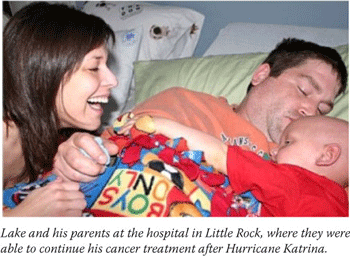
Lessons Learned from Katrina
 The upside to mayhem and devastation caused by a natural disaster is that the rebirth of affected communities usually makes them stronger. This is what is happening to the oncology groups that participate in NCI's Community Clinical Oncology Program (CCOP) in the Gulf Coast region, which was devastated by Hurricane Katrina late in 2005.
The upside to mayhem and devastation caused by a natural disaster is that the rebirth of affected communities usually makes them stronger. This is what is happening to the oncology groups that participate in NCI's Community Clinical Oncology Program (CCOP) in the Gulf Coast region, which was devastated by Hurricane Katrina late in 2005.
"We were not prepared for Katrina," admits Eric Anderson, the clinical trials coordinator and CCOP administrator at Ochsner Cancer Institute in New Orleans, one of three CCOPs affected by the storm that caught so many off guard.
Despite a lack of preparation, patients who were enrolled in clinical trials were able to continue their treatment at other hospitals, even as far away as Seattle, because of CCOP connections around the country.
"If a Katrina patient had come to us, it would have been easy to care for them," says Dr. Loren Tschetter, principal investigator at the Sioux Community Cancer Consortium in Sioux Falls, SD. "The mechanism of a national CCOP program ensures that these patients can be taken care of in an efficient and careful manner by experienced staff."
This was the case for Hewan Gebrehiwot, whose daughter, Wintana Solomon, was 5-years-old at the time and in treatment for acute lymphoblastic leukemia with the Louisiana State University Minority-based CCOP (LSU MB-CCOP) at Children's Hospital in New Orleans.
"I was so worried," recalls Mrs. Gebrehiwot. When the order came to evacuate, she drove her family to Atlanta to stay with friends, and checked in with the hospital at Emory University. "I showed them Wintana's paperwork, and they had no problem at all. They started the correct medicine right away."
Another Louisiana resident, Chantel Kiger, fled to Little Rock, AR, with her toddler son, Lake, who had been diagnosed with medulloblastoma earlier in the year and was just finishing his first month of chemotherapy after surgery to remove the tumor.
"The hurricane wasn't nearly as scary as learning that Lake's cancer had come back," she recalls.
With her son's medical records in hand, the hospital staff in Little Rock was able to notify the boy's New Orleans oncologist of his location and continue his course of treatment. "They did a phenomenal job of helping us to get the care that my son needed," says Ms. Kiger.
Three years later, there's good news to report. Both Wintana and Lake are in remission and have returned home with their families.
The CCOPs are also back to business, with emergency measures in place, including patient ID cards developed by or similar to the ones developed by ASCO, and other methods to track patients and recover medical records, should they need to evacuate again.
"Out of the Katrina catastrophe, a model program has evolved in which public and state institutions and community doctors who weren't previously engaged in clinical research are working together," says NCI's Dr. Worta McCaskill-Stevens, who helps to oversee the CCOP program in the Division of Cancer Prevention. She notes that the LSU MB-CCOP has enrolled more than 150 new cancer patients since the hurricane.
Mr. Anderson reports that the Ochsner CCOP has caught up with where it was before the storm, in terms of protocols and patients enrolled in trials.
"We have a lot of institutional pride and commitment to the CCOP mission," he says. "As we recovered from the storm, we looked back at the time when our CCOP had been hugely successful, and it felt like a quest to see how we could make it good again, in the face of this great adversity."
—Brittany Moya del Pino
|